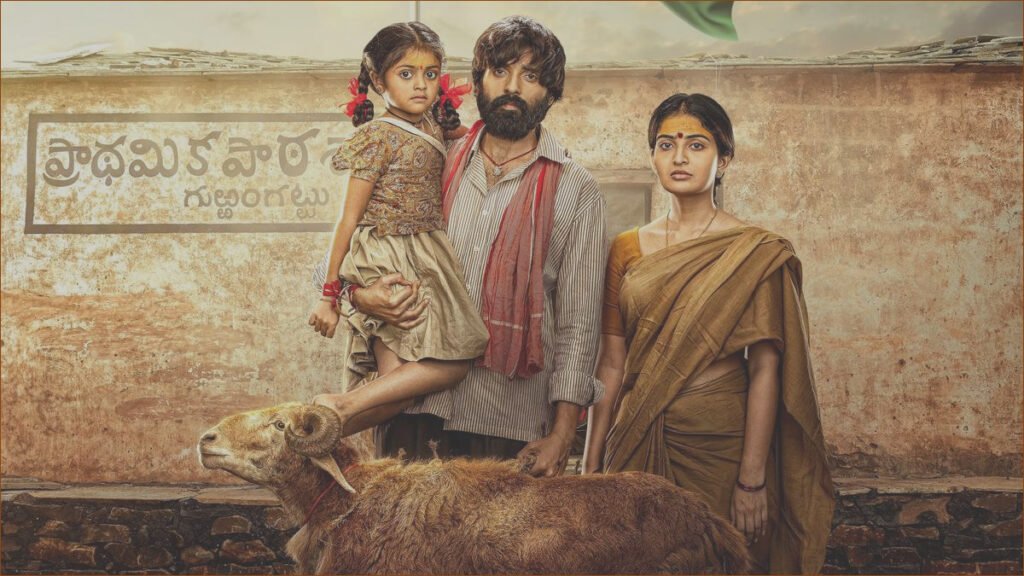In a cinematic landscape where the audacious often meets the oppressive, the Telugu film Pottel emerges as a striking and poignant narrative not meant for the delicately inclined. Crafted with the deft hands of Sahit Mothkuri, this film is a formidable exploration of education as a beacon of hope in the relentless fight against subjugation—an urgent clarion call echoing from the Vikarabad region of Telangana, albeit set a few decades back.
The ensemble cast—Yuva Chandra Krishna, Ananya Nagalla, and Ajay—bolsters Mothkuri’s vision, delivering performances that resonate with emotional depth. Yet, amid the cerebral and moving exchanges that compel one to root for a father’s fervent quest for his daughter’s education, there looms a specter of melodrama. The repeated violence against women and children casts a shadow, rendering moments of stark reality deeply uncomfortable for viewers.
At the crux of this narrative lies a titanic clash between two diametrically opposed figures: Patel, who embodies tyranny, orchestrating his village through a veil of fear and ritualistic cruelty—sacrificing lives in the name of divine blessing—and Gangadhar, a spirited goatherd who perceives enlightenment as the only antidote to the venomous grip of oppression. Their antagonism is both personal and societal, representing a broader commentary on caste dynamics.
In the opening scenes, the audience is thrust into the brutal world of Patel, the film painting a vivid picture of his tyranny, while Gangadhar’s race against time to rescue his daughter unfolds with palpable urgency. Patel emerges as a quintessential villain, echoing tropes familiar in mass masala cinema—armed with a need for dominance, leaving devastation in his wake, particularly among the voiceless women and cowed villagers who follow his dictates without question.
However, Mothkuri injects an essential commentary on the transformative power of education, showcased wrenchingly through an incident involving the lack of literacy that leads to tragedy—a pivotal event that starkly demonstrates how the fight against ignorance could have dramatically altered fates. The village, under the suffocating rule of the upper-caste Patels, systematically denies educational access to those deemed ‘lower’.
What amplifies this narrative is the slow revelation of Gangadhar as not merely a figure headbutting against suffocating tradition, but as a parent aspiring for a brighter tomorrow for his daughter, Saraswathy. The name itself is not coincidental; it implies wisdom and knowledge, merging beautifully with the film’s thematic essence. Mothkuri’s story unfolds subtly, suggesting that change is often a generational affair, yet the road toward enlightenment is tortuous.
Bujjiamma, portrayed by Ananya Nagalla, is introduced as a supportive yet distinct character, embodying resilience in a world where female characters often fade into the background. The film’s intention to highlight her strength resonates, even as fragmented narratives of violence against women surface, at times resorting to emotional manipulation that feels excessive.
Amidst the despair, flickers of hope emerge: a teacher’s transformation, a child’s newfound understanding of literacy from neglected pamphlets—the narrative oscillates between possibility and crisis, fulfilling its promise yet periodically succumbing to predictable melodrama.
Yuva Chandra, Ananya, and Ajay’s performances are laudable, knit tightly into the fabric of a story desperate for a more exquisite balance between brutality and sensitivity. Complemented by Sekhar Chandra’s evocative score and Monish Bhupathi Raju’s cinematographic portrayal of an arid, unforgiving land, Pottel ultimately urges viewers to reconsider the narrative of education amidst oppression.
Were this film to temper its reliance on overt brutality, perhaps a more sophisticated narrative would unfold, inviting audiences into a deeply nuanced experience of struggle and resilience.
Pottel is currently lighting up the theaters, beckoning the brave-hearted.

